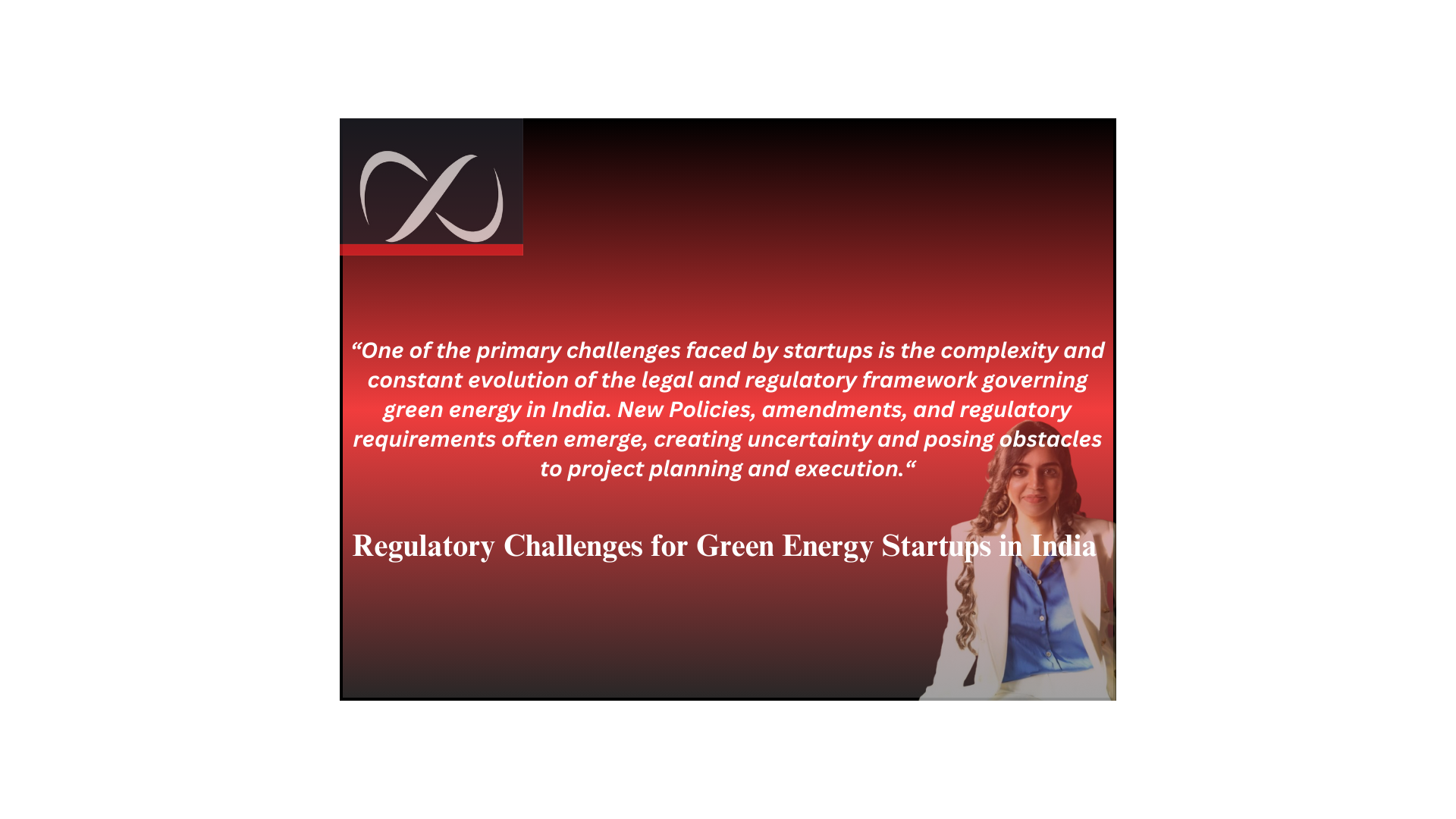India’s energy sector is witnessing a remarkable shift towards sustainability, with an increasing emphasis on renewable energy sources. For startups like GreenTech Energy Solutions, this presents an array of opportunities to innovate and contribute to the green energy revolution. However, amidst this promising landscape, navigating the intricate legal and regulatory framework poses significant challenges. While the Indian government is actively promoting green energy through policies and initiatives, startups in this sector encounter various legal hurdles that demand strategic solutions and diligent compliance efforts.
Challenge 1: Complex and Evolving Legal Framework
One of the primary challenges faced by GreenTech Energy Solutions is the complexity and constant evolution of the legal and regulatory framework governing green energy in India. New policies, amendments, and regulatory requirements often emerge, creating uncertainty and posing obstacles to project planning and execution.
Solution:
GreenTech Energy Solutions recognized the importance of staying abreast of regulatory changes and ensuring compliance with evolving legal standards. To address this challenge, the company implemented several strategies:
– Engaging Specialized Counsel: GreenTech partnered with legal experts specializing in energy law to receive timely updates on regulatory changes and guidance on compliance specific to their projects.
– Subscription to Industry Resources: The company subscribed to legal newsletters, publications, and online platforms focusing on the Indian green energy sector. These resources provided valuable insights and updates from legal experts, enabling GreenTech to adapt its strategies accordingly.
– Internal Training Programs: GreenTech organized internal training sessions for its team members to enhance awareness about the evolving regulatory framework. Legal professionals were invited to conduct workshops, ensuring that the team remained well-informed and equipped to address legal challenges effectively.
– Participation in Industry Events: The company encouraged its team members to participate in industry conferences, workshops, and webinars to stay updated on the latest regulatory developments and network with legal professionals.
– Regulatory Tracking Systems: GreenTech utilized online regulatory tracking systems and legal tech platforms to monitor changes in green energy regulations. These tools provided alerts and summaries of relevant amendments, allowing the company to proactively adapt its strategies.
– Scenario Planning and Project Flexibility: GreenTech developed flexible project plans capable of adapting to potential regulatory changes. Scenario planning exercises were conducted to assess the impact of different regulatory scenarios on projects and develop contingency plans accordingly.
– Government Agencies and Industry Associations: The company established open communication channels with relevant government agencies and actively participated in industry associations focused on green energy. This facilitated early insights into potential policy changes and opportunities to provide feedback during regulatory drafting stages.
– Compliance Management Platforms: GreenTech explored legal tech platforms designed specifically for the energy sector to streamline compliance processes, receive regulatory updates, and generate reports ensuring adherence to the latest regulations.
– Online Legal Research Tools: The company utilized online legal research tools and databases to access and analyze relevant laws, regulations, and court decisions pertaining to green energy projects, ensuring comprehensive legal compliance.
Challenge 2: Lengthy Permitting Process
GreenTech Energy Solutions encountered significant delays in obtaining necessary permits and clearances from various agencies for its green energy projects. These delays posed challenges to project timelines and budgets, impacting the company’s operations and growth.
Solution:
To address this challenge, GreenTech Energy Solutions implemented the following solutions:
– Understanding Permit Requirements: The company conducted a thorough review of all central, state, and local permits required for its green energy projects, ensuring comprehensive preparation and avoiding delays due to missing documentation.
– Transparency and Compliance: GreenTech ensured that all application documents were accurate, complete, and complied with the specific requirements of each agency. This proactive approach minimized the risk of delays due to application rejections.
– Engaging Permitting Consultants: The company partnered with experienced permitting consultants who possessed in-depth knowledge of permit procedures and established relationships with relevant agencies. This expedited the permitting process, saving time and resources.
– Early Legal Consultation: GreenTech consulted with legal experts specializing in environmental law to ensure compliance with all relevant regulations, addressing potential environmental concerns upfront and avoiding delays during the permitting process.
Challenge 3: Land Acquisition
Acquiring land for green energy projects, especially solar and wind farms, posed significant challenges due to complex land acquisition laws and resistance from local communities.
Solution:
To overcome this challenge, GreenTech Energy Solutions adopted the following strategies:
– Understanding Land Acquisition Laws: The company thoroughly understood the legal framework surrounding land acquisition in specific states where its projects were located. Legal counsel was consulted to ensure compliance with relevant laws and regulations.
– Transparency in Land Dealings: GreenTech maintained transparency throughout the land acquisition process, clearly communicating project benefits and compensation packages to landowners. Legal requirements for consent were adhered to, ensuring fairness and legality in all dealings.
– Engaging Land Acquisition Specialists: The company partnered with experienced land acquisition specialists who navigated negotiations effectively and resolved potential legal disputes. Their expertise streamlined the process and ensured compliance with legal requirements.
– Social Impact Assessment (SIA): GreenTech conducted comprehensive Social Impact Assessments (SIAs) to identify potential social and environmental consequences of its projects on local communities. This responsible approach allowed for early mitigation strategies and addressed community concerns.
– Alternative Dispute Resolution (ADR): The company explored Alternative Dispute Resolution (ADR) mechanisms like mediation or arbitration to address disagreements with landowners swiftly and cost-effectively, avoiding lengthy legal proceedings.
– Government Land Acquisition Schemes: GreenTech researched and explored government land acquisition schemes specifically designed for green energy projects. These schemes streamlined the process and expedited land acquisition, facilitating project implementation.
Conclusion
In conclusion, GreenTech Energy Solutions’ journey in navigating the legal and regulatory landscape for green energy startups in India underscores the importance of strategic planning, compliance efforts, and proactive engagement with legal experts and stakeholders. By leveraging specialized legal counsel, staying informed about regulatory changes, and adopting responsible and transparent practices, GreenTech successfully overcame legal hurdles and positioned itself for sustainable growth in India’s green energy sector. As the country continues its transition towards renewable energy, startups like GreenTech play a crucial role in driving innovation, promoting sustainability, and creating a brighter, cleaner future for generations to come. Through lawful and professional solutions, startups can navigate the green energy landscape with confidence, contributing to India’s energy security and sustainable development goals.












